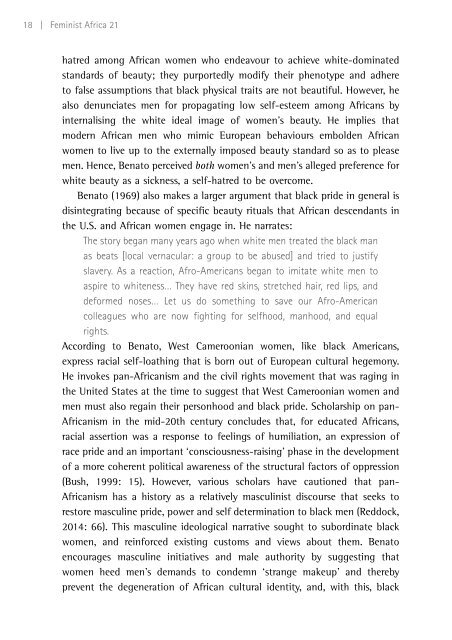The politics of fashion and beauty in Africa
fa21_proof_3
fa21_proof_3
You also want an ePaper? Increase the reach of your titles
YUMPU automatically turns print PDFs into web optimized ePapers that Google loves.
18 | Fem<strong>in</strong>ist <strong>Africa</strong> 21<br />
hatred among <strong>Africa</strong>n women who endeavour to achieve white-dom<strong>in</strong>ated<br />
st<strong>and</strong>ards <strong>of</strong> <strong>beauty</strong>; they purportedly modify their phenotype <strong>and</strong> adhere<br />
to false assumptions that black physical traits are not beautiful. However, he<br />
also denunciates men for propagat<strong>in</strong>g low self-esteem among <strong>Africa</strong>ns by<br />
<strong>in</strong>ternalis<strong>in</strong>g the white ideal image <strong>of</strong> women’s <strong>beauty</strong>. He implies that<br />
modern <strong>Africa</strong>n men who mimic European behaviours embolden <strong>Africa</strong>n<br />
women to live up to the externally imposed <strong>beauty</strong> st<strong>and</strong>ard so as to please<br />
men. Hence, Benato perceived both women’s <strong>and</strong> men’s alleged preference for<br />
white <strong>beauty</strong> as a sickness, a self-hatred to be overcome.<br />
Benato (1969) also makes a larger argument that black pride <strong>in</strong> general is<br />
dis<strong>in</strong>tegrat<strong>in</strong>g because <strong>of</strong> specific <strong>beauty</strong> rituals that <strong>Africa</strong>n descendants <strong>in</strong><br />
the U.S. <strong>and</strong> <strong>Africa</strong>n women engage <strong>in</strong>. He narrates:<br />
<strong>The</strong> story began many years ago when white men treated the black man<br />
as beats [local vernacular: a group to be abused] <strong>and</strong> tried to justify<br />
slavery. As a reaction, Afro-Americans began to imitate white men to<br />
aspire to whiteness… <strong>The</strong>y have red sk<strong>in</strong>s, stretched hair, red lips, <strong>and</strong><br />
deformed noses… Let us do someth<strong>in</strong>g to save our Afro-American<br />
colleagues who are now fight<strong>in</strong>g for selfhood, manhood, <strong>and</strong> equal<br />
rights.<br />
Accord<strong>in</strong>g to Benato, West Cameroonian women, like black Americans,<br />
express racial self-loath<strong>in</strong>g that is born out <strong>of</strong> European cultural hegemony.<br />
He <strong>in</strong>vokes pan-<strong>Africa</strong>nism <strong>and</strong> the civil rights movement that was rag<strong>in</strong>g <strong>in</strong><br />
the United States at the time to suggest that West Cameroonian women <strong>and</strong><br />
men must also rega<strong>in</strong> their personhood <strong>and</strong> black pride. Scholarship on pan-<br />
<strong>Africa</strong>nism <strong>in</strong> the mid-20th century concludes that, for educated <strong>Africa</strong>ns,<br />
racial assertion was a response to feel<strong>in</strong>gs <strong>of</strong> humiliation, an expression <strong>of</strong><br />
race pride <strong>and</strong> an important ‘consciousness-rais<strong>in</strong>g’ phase <strong>in</strong> the development<br />
<strong>of</strong> a more coherent political awareness <strong>of</strong> the structural factors <strong>of</strong> oppression<br />
(Bush, 1999: 15). However, various scholars have cautioned that pan-<br />
<strong>Africa</strong>nism has a history as a relatively mascul<strong>in</strong>ist discourse that seeks to<br />
restore mascul<strong>in</strong>e pride, power <strong>and</strong> self determ<strong>in</strong>ation to black men (Reddock,<br />
2014: 66). This mascul<strong>in</strong>e ideological narrative sought to subord<strong>in</strong>ate black<br />
women, <strong>and</strong> re<strong>in</strong>forced exist<strong>in</strong>g customs <strong>and</strong> views about them. Benato<br />
encourages mascul<strong>in</strong>e <strong>in</strong>itiatives <strong>and</strong> male authority by suggest<strong>in</strong>g that<br />
women heed men’s dem<strong>and</strong>s to condemn ‘strange makeup’ <strong>and</strong> thereby<br />
prevent the degeneration <strong>of</strong> <strong>Africa</strong>n cultural identity, <strong>and</strong>, with this, black



